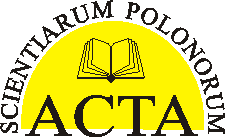Title
The effect of diversified potassium fertilization on the yield and chemical composition of Beta vulgaris L.
Autor
Katarzyna Dzida, Zbigniew Jarosz, Zenia Michałojć
Keywords
Beta vulgaris L., mineral nutrition, macroelements, vitamin C, nitrates
Abstract
The nutritive value of Beta vulgaris L. result mainly from its high content of protein gathered both in leaf blades and in petioles, and from high content of mineral salts, mainly iron and calcium, as well as vitamins C, A, B1, B2. Purpose of the research was to determine the effect of type potassium fertilizer (potassium chloride, potassium sulphate and potassium chloride + potassium sulphate in 1:1 K ratio) and different dose of potassium (0.6; 1.2; 1.8 g∙dm-3) on the yield and chemical composition of Beta vulgaris L. The plants were cultivated in a greenhouse, in pots filled deacidified highmoor peat. Regardless of the type of potassium fertilizer, the yield of Beta leaves was the highest with the application of 0.6 g K·dm-3. Leaves of Beta vulgaris L. fertilized with potassium chloride contained least nitrates, whereas plants fertilized with K2SO4 and KCl + K2SO4 contained much more nitrates. Increasing doses of potassium had a positive effect on the content of vitamin C in the leaves. The research revealed a negative effect of increasing potassium dose on the plant unit weight, leaf length and percentage content of total nitrogen, protein and dry weight in leaves, especially at application of potassium chloride and potassium sulphate. The research showed the growth of potassium and total salt concentration content in bedding as the effect of increasing potassium doses at the application of KCl and K2SO4. In cultivation of Beta vulgaris L., the application of 0.6 g K·dm-3 bedding leads to the highest yield of leaf fresh weight, while application of 1.8 g K·dm-3 bedding leads to the highest content of vitamin C in fresh mass.
Pages
263-274
Cite
Dzida, K., Jarosz, Z., Michałojć, Z. (2011). The effect of diversified potassium fertilization on the yield and chemical composition of Beta vulgaris L.. Acta Sci. Pol. Hortorum Cultus, 10(4), 263-274.
Full text


